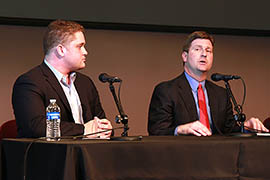Cronkite News has moved to a new home at cronkitenews.azpbs.org. Use this site to search archives from 2011 to May 2015. You can search the new site for current stories.
Google, cities announce collaboration on ultra-high speed Internet service
PHOENIX – Google will collaborate with Phoenix, Scottsdale and Tempe to develop ways to bring its high-speed wireless Internet network to the Valley, the technology giant and the cities’ mayors announced Wednesday.
“Our ability as a community to offer ultra-high speeds in the marketplace is fundamental in our competitiveness in the 21st century economy,” Phoenix Mayor Greg Stanton said at a news conference unveiling the partnership.
The service, Google Fiber, is touted as 100 times faster than traditional broadband, allowing users to download a two-hour movie in a little more than 30 seconds. In Kansas City, Mo., where the Google Fiber launched in 2012, the ultra-fast connection costs $70 a month.
It also offers a free traditional network, one with speeds comparable to broadband Internet, though users in Kansas City must pay $300 to help cover the cost of construction.
Google, based in Mountain View, Calif., has asked the three cities to put together a team to provide the information needed to install the Google Fiber infrastructure. None of the cities would provide Google subsidies for adding the service, Stanton said.
“If we are successful and Google decides to move forward with this massive investment in our cities, they will be an option for all the residents of our city,” said Stanton, joined by Scottsdale Mayor Jim Lane and Tempe Mayor Mark Mitchell.
Google is installing the service in Austin, Texas, and Provo, Utah, and hopes to expand to cities such as San Antonio, Portland, Ore., and Nashville, Tenn., said Andrew Silvestri, Google’s public policy and community affairs representative.
“Over the last few years, these cities and these mayors have worked tremendously hard to make technology a part of their local economies, and today they’re taking the next steps by rolling up their sleeves to ensure their citizens have the necessary foundations to thrive in the 21st century,” Silvestri said.
At present, Google Fiber is designed for neighborhoods, though Silvestri suggested that it could expand to include small businesses.
Google allows certain nonprofit and public organizations to select sites such as city buildings, community centers, libraries and schools to receive the ultra-high speed network for free.
Mitchell, Tempe’s mayor, said adding Google Fiber would boost Arizona’s economy.
“You have three cities working together to help improve the quality of life of all the residents in the Valley, but more importantly to help drive commerce not only to our own cities but for the state of Arizona,” he said.







